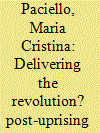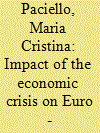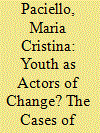| Srl | Item |
| 1 |
ID:
125897


|
|
|
|
|
| Publication |
2013.
|
| Summary/Abstract |
Two years after the popular mobilisations in Egypt and Tunisia of early 2011, post-uprising authorities, including the Islamist parties that came to power, have failed to deliver on the demands for social justice that triggered those protests. They have responded to past and present socio-economic challenges by adopting measures that are in clear continuity with previous regimes and lacking any coherent long-term vision of economic reform. Indeed, albeit with differences between the two countries, post-uprising authorities, lacking experience and competence, have not fully broken with the old system in reconfiguring power relations within and outside state institutions and have continued to adopt a top-down approach to economic decision-making.
|
|
|
|
|
|
|
|
|
|
|
|
|
|
|
|
| 2 |
ID:
098803


|
|
|
|
|
| Publication |
2010.
|
| Summary/Abstract |
The ongoing global financial and economic crisis, which initially emerged in North America and Europe, has increasingly spread to emerging and developing countries, including the Southern Mediterranean. The global economic crisis could pose, and is posing, a number of challenges to Euro-Mediterranean relations. On the political front, it has contributed to further undermining the political reform agenda included in the Barcelona Process and the European Neighbourhood Policy. On the economic front, the crisis is jeopardising trade integration in the Euro-Mediterranean area and could slow down the pace of economic reforms supported by the European Union in Southern Mediterranean countries.
|
|
|
|
|
|
|
|
|
|
|
|
|
|
|
|
| 3 |
ID:
160356


|
|
|
|
|
| Summary/Abstract |
In the last decades, ‘youth’ has increasingly become a fashionable category in academic and development literature and a key development (or security) priority. However, beyond its biological attributes, youth is a socially constructed category and also one that tends to be featured in times of drastic social change. As the history of the category shows in both Morocco and Tunisia, youth can represent the wished-for model of future citizenry and a symbol of renovation, or its ‘not-yet-adult’ status which still requires guidance and protection can be used as a justification for increased social control and repression of broader social mobilisation. Furthermore, when used as a homogeneous and undifferentiated category, the reference to youth can divert attention away from other social divides such as class in highly unequal societies.
|
|
|
|
|
|
|
|
|
|
|
|
|
|
|
|